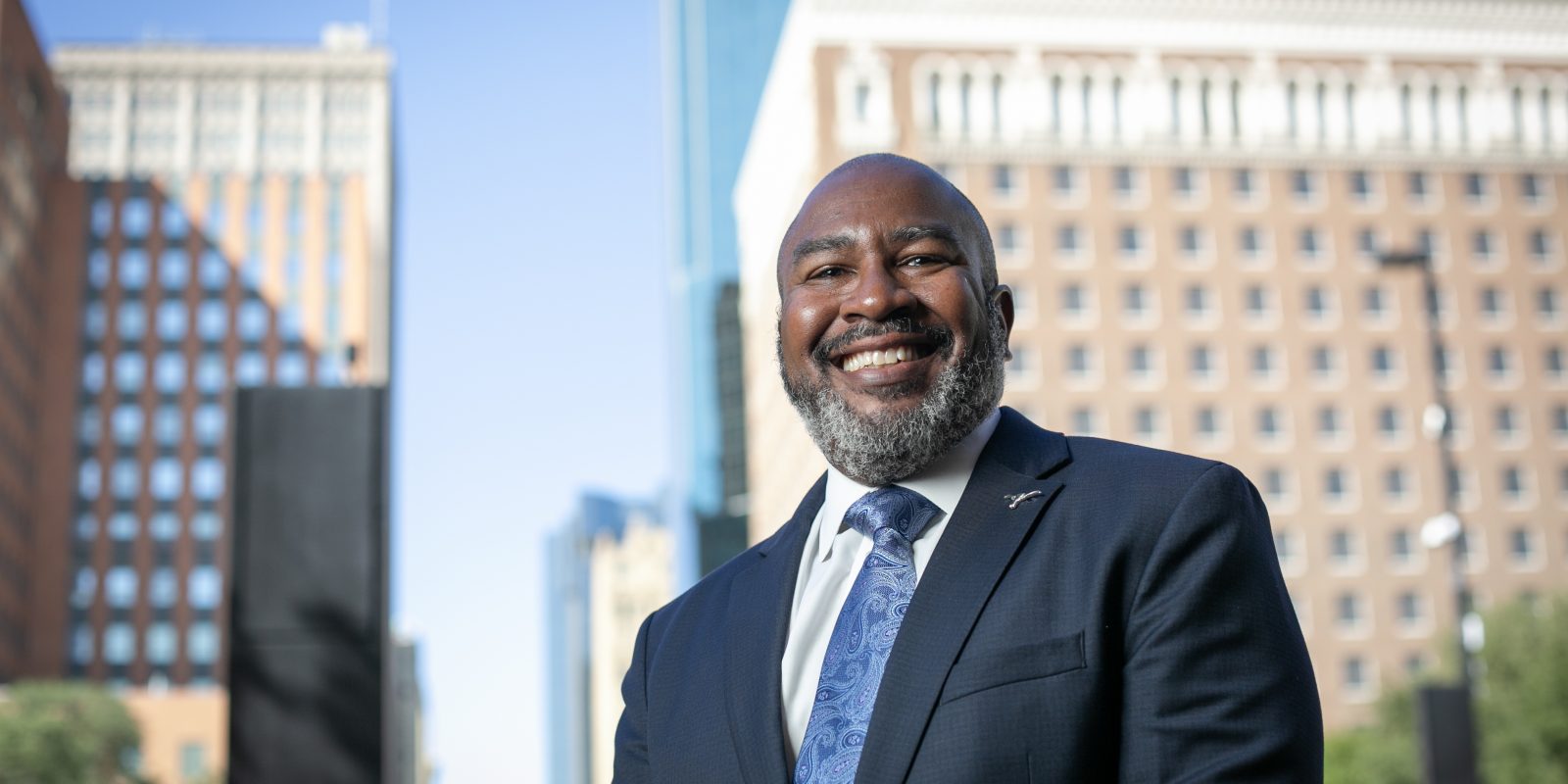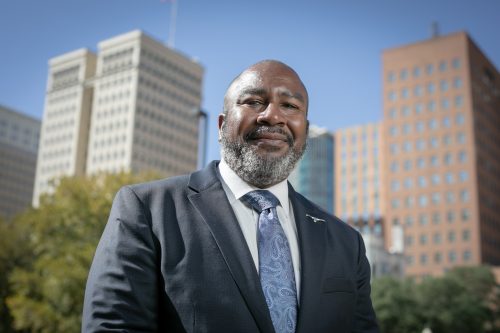
Robert Sturns, economic development director for Fort Worth, said the city's ability to attract and retain jobs may depend on its relationship with TCU’s research community. Photo by Rodger Mallison
Banking on Growth
As Fort Worth continues to expand, Robert Sturns helps attract big business.
ROBERT STURNS, A SECOND-GENERATION FORT WORTH CITY ADMINISTRATOR, is at the helm of the city’s seismic growth. As the economic development director, Sturns is a key player in the business expansions and relocations that have put the Dallas-Fort Worth region on pace to overtake Chicago as the country’s third most populous metro area.
Fort Worth led the nation with the largest year-over-year population increase, adding more than 19,000 people from 2022 to 2023 for a total of 957,000 residents, reports the U.S. Census Bureau.
Sturns said the city can’t rest on past success or take continued growth for granted. Fort Worth’s ability to attract and retain jobs tomorrow may depend on its relationship with TCU’s research community today, he said.
“When we’re talking to companies, they want to know what resources you have on the ground today. What does the educational system look like? What kind of graduates are you churning out? What fields are they in? What type of research is already going on?” Sturns said. “And our ability to provide positive answers to those questions obviously relates to the attractiveness of the city.”
FINDING HIS PATH
Sturns is a Fort Worth native with strong roots in public service. His uncle, Louis Sturns, a now-retired judge for the 213th District Court in Tarrant County, was the first Black person to serve on the Texas Court of Criminal Appeals. His father, Vernell Sturns, was assistant city manager of Fort Worth in the mid-1980s and later served as executive director of DFW International Airport. He was also the first Black member of the TCU Board of Trustees.
“Obviously, his background probably shaped a little bit of my getting into local government,” Sturns said. “It really wasn’t something that I was focused on when I was in college but, having grown up and seen his work and his life experiences, I think it was definitely an area that had some interest to me.”
One of the main lessons Sturns learned from his father, he said, was to find joy in civic work, even though doing so can be difficult considering the mountain of expectations.
“I do remember when I started as economic development director, he said, ‘Oh, that’s going to be tough given the city’s potential growth,’ but he was always someone who has found joy in his work and found the humorous side of things,” Sturns said. “I try to maintain that posture.”

Barbara Smyers | Istock | Getty Images
Charles Daniels, city manager of Forney, Texas, said Vernell Sturns mentored him when he started his own public administration career.
“Vernell was instrumental in mentoring young would-be public administrators in all aspects of the profession, teaching us to never stop learning and to stay the course,” said Daniels, who served as Fort Worth’s assistant city manager from 2008 to 2015. “Robert certainly has kept those tenets to heart and has not only made Fort Worth a better place to live and work but distinguished himself as one of the best economic gurus in the country.”
Out of high school, Sturns initially had an interest in theater. For his undergraduate degree at Stephen F. Austin State University, he focused on a career in radio and TV.
He joined the U.S. Army in May 1990 as an officer. He was in officer training during the ramp-up to Operation Desert Storm and was “fully planning to get shipped over,” but by the time he graduated in February 1991, the Gulf War was over. Sturns spent 10 years in the Army Reserve, leaving as a captain.
While in the Army Reserve, Sturns pursued a career in commercial real estate. During that time, he earned an MBA from the TCU Neeley School of Business. After graduating, he pursued a brief career in banking, but it wasn’t a fit.
One day, while reading an article in the Fort Worth Star-Telegram, he saw that the city was looking for a project manager to help steer a major development.
“I said … ‘Let me put my hat in the ring for this and see how that plays out,’ ” Sturns said. “It really tied into both my real estate background and some of the things I learned in banking, too. I got the job and really thought I’d be here about five years and go do something else. But here it is 23 years later and I’m still plugging away at economic development. I love it.”
PARTNERS IN GROWTH
To lure a company to Fort Worth, Sturns said he typically has a few incentives at his disposal, such as reimbursement grants and tax abatements, but incentives go only so far. Sturns said he can’t incentivize a company to relocate if he doesn’t have the assets it needs on the ground.
Sturns met with Floyd Wormley Jr., TCU’s vice provost for research and dean of graduate studies, to discuss how the city and university could work together on creating more opportunities for graduates. Their free-flowing conversation covered strengths of TCU’s research programs — particularly in biotech — and the city’s willingness to compete for the best ideas.

Fort Worth native Robert Sturns earned his MBA from TCU after serving in the U.S. Army. Photo by Rodger Mallison
Sturns praised TCU’s Neeley Institute for Entrepreneurship and Innovation and said he’d like the city to be more engaged in helping to create opportunities for promising ideas to flourish. Sturns also said he’d like more comprehensive student and graduate employment data.
“I would say the biggest thing that we have challenges with is in knowing how many of those students are staying somewhere within the DFW metroplex,” Sturns said. “To the extent that we can help kind of quantify that for companies so that they have a general understanding, it would be helpful.”
He said the Anne Burnett Marion School of Medicine at TCU should be a hub for innovation and research, creating opportunities for collaboration between academia and industry.
“We want to keep our hands on the pulse of what’s going on 10, 15, 20 years from now so we can provide the training for those upcoming skill sets within our undergraduate and graduate populations,” Wormley said. “We’re linking with local corporations and asking about the areas where they want to grow. How can we benefit you? How can we best train the workforce you will need?”

Your comments are welcome
Comments
Related reading:
Research + Discovery
Deeper Compassion
Joe Hoyle’s capstone project examines the impact of empathy training on scuba volunteers.
Immersed in Exercise
Kinesiologist Robyn Trocchio turns to virtual reality to help people have fun getting fit.
Life on the Fringe
Tricia Jenkins’ podcast on growing up in a cult draws acclaim.